Share On Social!
A farmer’s market is a lot of fun—for parents only, usually.
Kids often just tag along, glumly, as their parents busily shop for fresh fruits and vegetables.
That is, until the Market Sprouts Kids Club.
Kaely Summers and other farmer’s market managers in Oregon teamed up to create the Market Sprouts Kids Club program to teach Latino kids and other kids who come to the market about farming, fresh produce, and healthy eating.
Now kids ages 5-12 who visit local markets, like Summers’ Forest Grove Farmer’s Market in Forest Grove, Ore., (23.1% Latino), do fun, interactive activities alongside farmers and volunteers who teach about healthier foods and healthier choices!
Farmer’s Markets and Children in Oregon
Officials with Adelante Mujeres, a non-profit organization focusing on Latinos in Forest Grove, have been keenly aware of the need for Latino families to enjoy healthier lives.
About 40% of the Latinos in the community served by Adelante Mujeres live in poverty. The gaps in opportunity and achievement can be seen by age 3, according to the Social Venture Partners Portland Blog newsletter.
That’s part of the reason Adelante Mujeres has been managing Forest Grove Farmers Market since 2005.
The market not only provides small farmers and food producers an outlet to unite communities with fresh, local foods, it also serves low-income residents through acceptance of federal food assistance programs (Supplemental Nutrition Assistance Program [SNAP], Women, Infants and Children [WIC] and Farm Direct Nutrition Program [FDNP]) and allowing farmers to participate in Sustainable Agriculture and Empresas Small Business Development programs.
On a weekly basis, the market brings in 2,000 visitors of all ages and race/ethnicities to share fresh food and listen to local musicians.
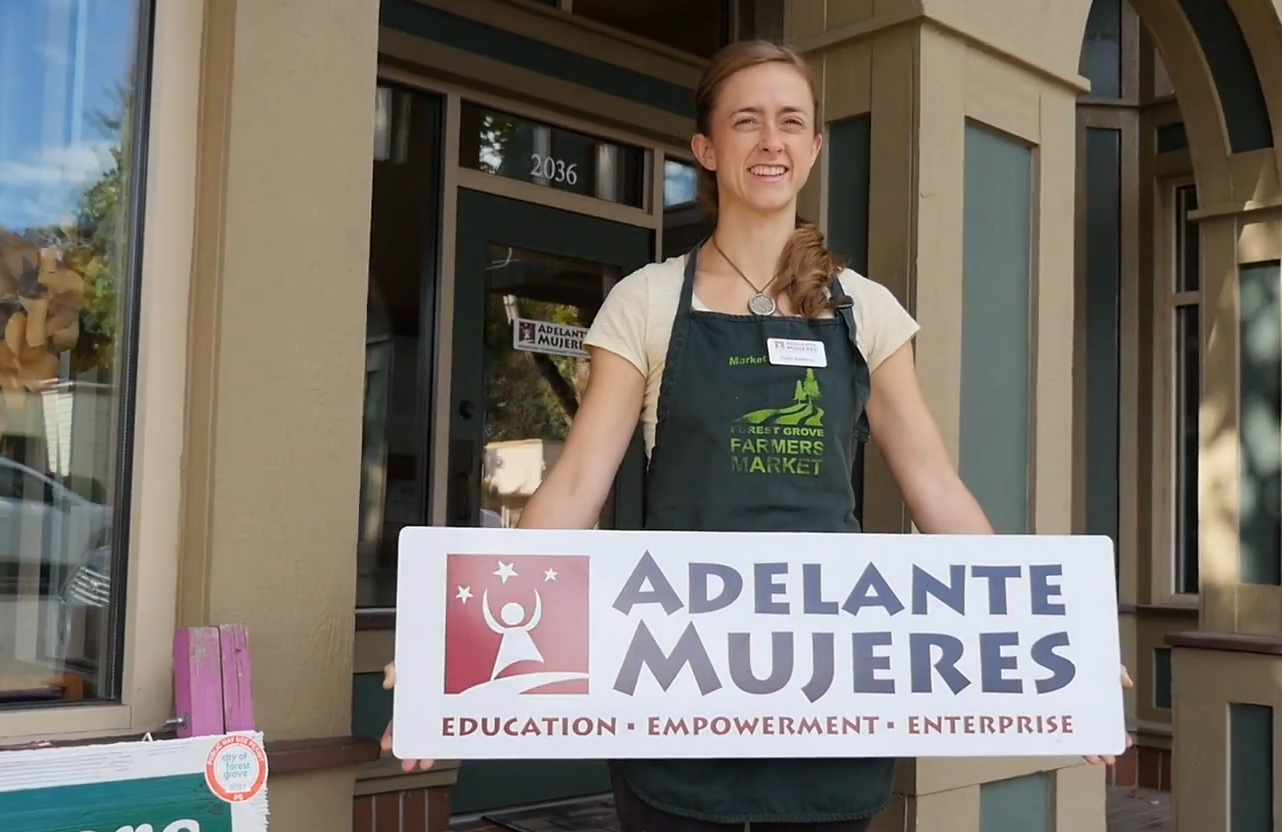
Summers is the manager of the Forest Grove Farmer’s Market
She says there are challenges with bringing kids to farmers markets. Parents are often busy with shopping and rarely have time to educate kids about new foods or healthy eating habits.
“We do see a lot of families come to the farmers market, and sometimes it’s hard—there’s music or there’s different things going on—but sometimes it’s like parents are just coaxing [their kids] along,” Summers said.
Washington County, Ore., is home to several farmers markets, including Forest Grove, North Plains, Hillsboro, and Beaverton.
At the time, none had educational activities for kids to boost their knowledge of healthier eating or farming.
Summers learned about a nearby program that was having success.
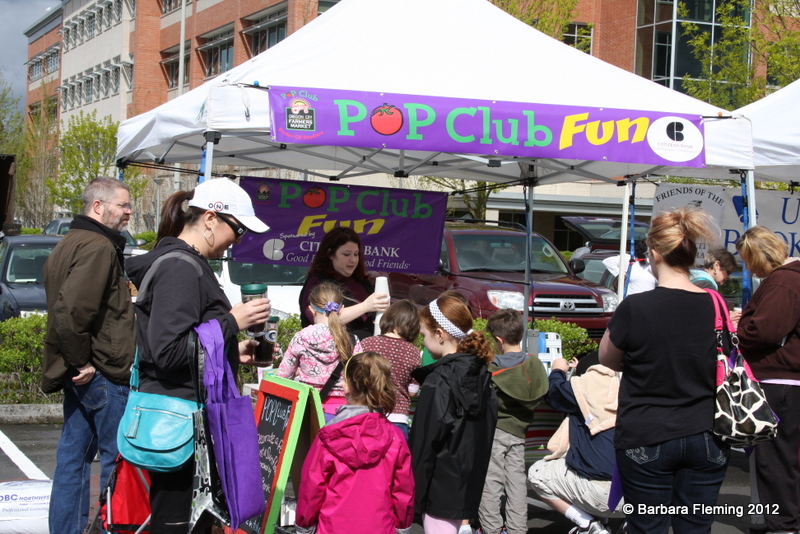
The Power of Produce (POP) program in Oregon City, Ore., allows kids to use tokens to buy their own produce or plants and has volunteers teach kids the importance of health through fun, interactive activities and classes.
Could something similar work in Washington County farmers markets?
Summers and other farmers market managers in Washington County believed they needed to do something to educate children who come to their farmers markets.
“We understood that if we didn’t reach kids, we were really missing out on an opportunity to really empower the kids to know where their food comes from, to inspire them to make healthy choices and really be involved in the eating process,” Summers said. “[Then] our young eaters are going to be supportive of vegetables in the future…and lead these larger public health changes in our future.”
A New Idea to Engage Kids in Learning at Farmer’s Markets in Oregon
Summer and the other managers of the farmers market in Washington County had previously arranged regular meetings to discuss market progress, new ideas and best practices.
In addition to Summers, managers included Vanessa Vandomelen (North Plains Farmers Market), Ginger Rapport (Beaverton Farmers Market), and Laura Conroy (Hillsboro Farmers Market).
At one of their meetings, they expressed a desire to work together to give kids a better market experience.
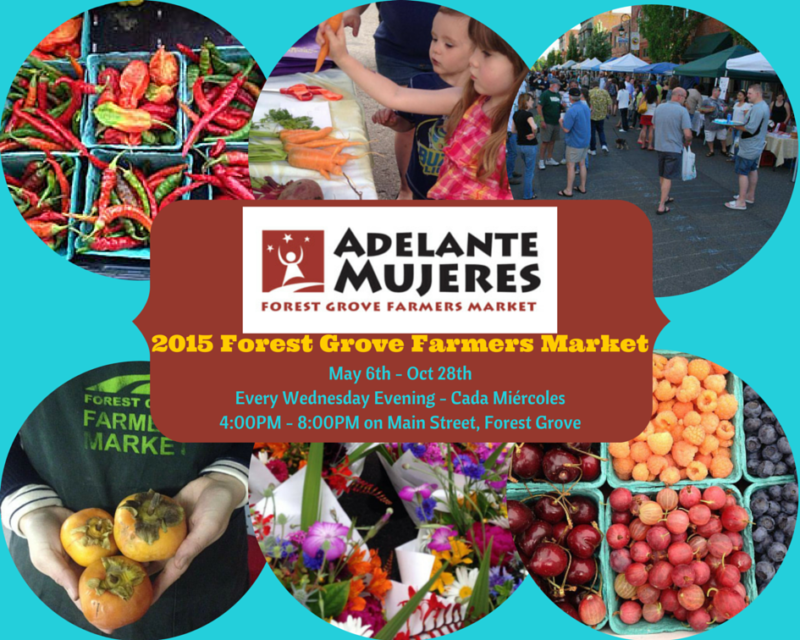 Summers said that the market managers often think about obesity and diabetes issues. She explained that if they could just get the kids involved in making healthier choices, it would be a win-win for everyone.
Summers said that the market managers often think about obesity and diabetes issues. She explained that if they could just get the kids involved in making healthier choices, it would be a win-win for everyone.
So they all joined in supporting the creation of a new program that would allow all kids to have fun and enjoy farmers market activities that encouraged healthy eating.
But, without funding, no educational program could get started.
Needing supplies for a curriculum, activities, and food tokens, the market managers thought they would try to differentiate their program from the famous POP program.
“We don’t have the funds year after year to give out tokens to kids every week,” Summers said. “We thought we would try just doing more activities.”
Getting the Market Sprouts Kids Club off the Ground
Since 2009, Summers and the other market managers knew of a grant opportunity through New Seasons Market, a local grocer in town that helps farmers markets with funding for educational and SNAP programs.
Forest Grove and many other farmers markets had applied for funding in the past to help apply SNAP matching dollars to their markets. Knowing they could apply together for the grant, the market managers drafted up a joint grant proposal to start their educational programming idea: the Market Sprouts Kids Club.

“We started rolling around different name ideas, and Market Sprouts sounded cute and fun and welcoming,” Summers said.
Knowing that this would be an expansive program across all markets, the market managers also planned on saving money together. They decided to use grant funds to share expenses of a graphic designer to create shared marketing materials, including a Market Sprouts logo. All markets also decided to save money through bulk ordering for program materials and giveaways.
They also worked together on a shared curriculum that each market could use along with shared resources.
“In Beaverton farmers market, they actually have the biggest farmers market in the state. They see thousands and thousands of shoppers every week,” Summers said. “So we realized each market would have to adapt those Market Sprouts curriculum pieces differently.”
Making fruits and vegetables at the local farmers markets more exciting than kids’ favorite cartoon characters found on boxes of processed foods at the grocery store, would be a challenge. Summers and the market managers team planned on combating marketing schemes targeted at kids, by giving kids free items and getting kids involved in interactive games, races, cooking classes, and scavenger hunts within the markets.
“As you know, there’s a lot of pressure from marketing companies of processed foods. They can make cutesy packaging; things that kids are going to ask their parents to buy for them,” Summers said. “So I think that was part of it, too. We wanted to make it fun, we wanted to make vegetables look inviting and cute and something that the kids would want to eat, and would ask their parents to buy them and be involved in that process.”
The program would be run by volunteers and allowed for flexibility in activities and learning agendas.
“Knowing that each market is different on the volunteer basis they have, and the folks in the community, if there’s a nurse or someone that wants to do an activity [for the kids] we’re able to accommodate for that and bring in that expertise,” Summers said.

They also sought to brand the Market Sprouts Kids Club with logos, specially made shopping bags, and market passports that kids would get every year they signed up for the club. The passport would encourage them to visit different market vendors and get their passport stamped at each location, filling their passport and allowing them to receive prizes for a completed passport. The overall plan was to expose kids to healthy eating, by incorporating fun games and activities to encourage kids to keep to coming to the markets weekly.
“You have to make things fun for kids, for them to get engaged in eating healthier we wanted to make sure that everything we were doing is fun,” Summers said.
Summers decided to translate the curriculum and have “key words” in Spanish for Latino kids at the markets, as Oregon’s Latino population has “boomed,” as reported by USA Today.
In May 2013, they received funding to introduce the Market Sprouts Kids Club to all the local markets.
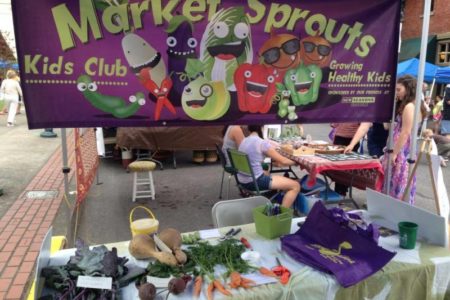
The program, with a motto of “growing healthy kids” and materials in English and Spanish, offers kids who attend local farmers markets the ability to sign up for club and receive a free bag, a passport, and the opportunity to participate in fun, interactive events, such as cherry-spitting contests, making superheroes out of vegetables, scavenger hunts, vegetable relays, and zucchini carving contests.
Market Sprouts Kids Clubs Grow in Popularity
Since the funding approval, each year from June 24 to Sept. 2, each local market encourages kids to sign up for the Market Sprouts Kids Club.
Summers said participating kids are trying new vegetables, having fun, and coming back to the markets weekly for kids club activities.
According to Summers, one of the favorite activities was when they allowed kids to grain mill by riding a bike and seeing how grain is turned to mill, then to dough, and finally to bread.
Being a nurse that, on a daily basis, views the effects diabetes can have on patients who have amputations due to severe diabetes, Vanessa Vandomelen, manager of the North Plains Farmers Market decided to expand the club’s awareness to reach local schools.
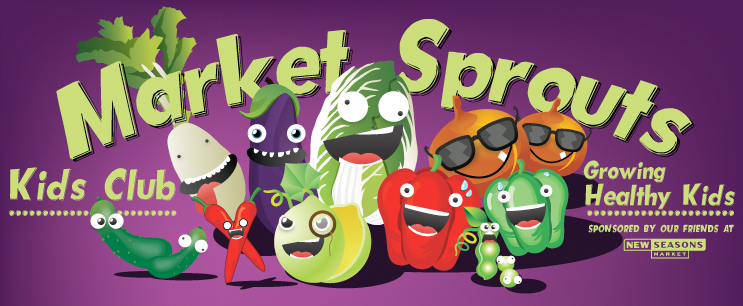
Vandomelen shares the Market Sprouts Kids Club in the local North Plains Elementary School by putting up a club banner, handing out flyers and free Market Sprouts branded bags. She also encourages parents and families to get involved in market activities by giving out free blueberries for back to school night and free strawberries from the market to students on field days.
“We really wanted to encourage young people to have fruits and vegetables, knowing that if they don’t get those opportunities before age 6, a lot of those kids won’t even look at fruits and vegetables as an option,” said Vandomelen. “That’s why I took my four girls [to the farmers market] for them to have the option to pick out fruits and vegetables on their own.”
All the markets that applied are now reaching thousands of families and hundreds of kids over the summer, introducing kids to healthier veggies and fruits that they may not have tried before.
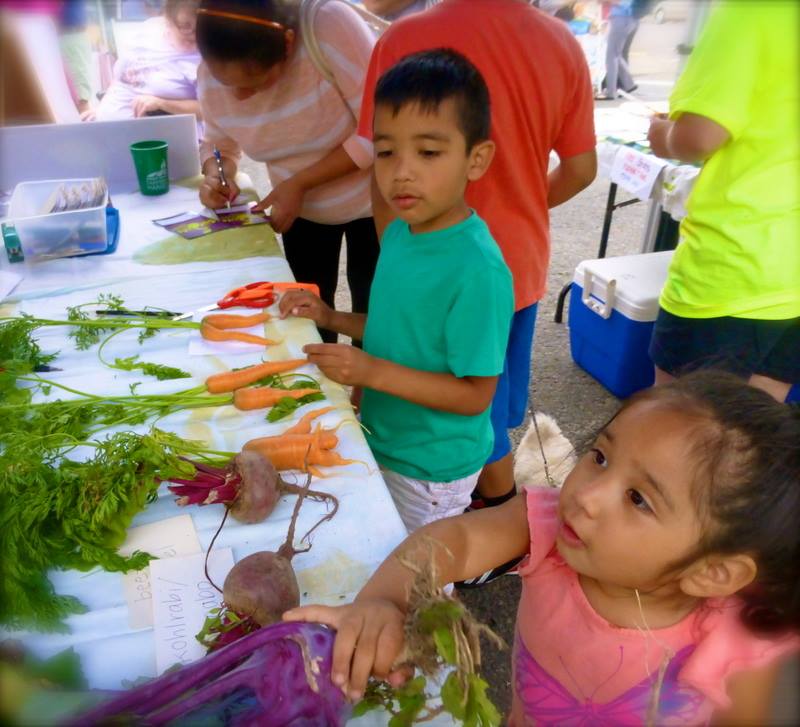
“It’s so encouraging to watch parents and kids shop together at the farmers market,” Vandomelen said. “The vegetables are right at kid’s level, so they pick up things they want to try and the experience is so different from your regular grocery store.”
Summers has run into parents who have kids in the club, and the parents tell her they appreciate and are surprised that their kids are eating vegetables that they have tried to get the kids to eat before at home, with no avail.
Market Sprouts Kids Club also reaches Latino families in the Adelante Mujeres organization not just through the Forest Grove Market, but also through their day care centers using Market Sprouts curriculum as a resource.
Summers also said that when parents come to the markets to get coupons for SNAP, kids always want to see what activities are going on for the Market Sprouts Kids Club, allowing them to reach more and more Latino families receiving SNAP.
Funding is applied for each year from the markets.
New Seasons funding has lasted three seasons, but Summers said that the Forest Grove Farmers Market could still continue on with the program if the funding was cut, as they could modify the activities and find private donors through Adelante Mujeres.
The club is 90% run by volunteers and continues to thrive through their contributions. Volunteers consist of public health students, farmers market summer interns, and community volunteers.
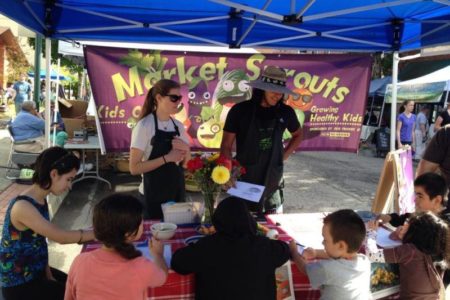
Summers stated that the volunteers add so much to the curriculum every year that they have created the Market Sprouts Kids Club Tool Kit, which allows them to share their ideas for other farmers markets wanting to do the same program.
Farmers markets that want to incorporate the program, but are short on funds, can still have success with starting their own kids club as Summers explained that often times farmers will donate produce, or give a discount to their programs. She experienced how a vendor in the past threw in an extra pound of cherries so that the kids could try them in their cherry-spitting contest.
Vandomelen said she believes the Market Sprouts Kids Club is a great place for “expanded education” for the parents, grandparents, and kids to be able to have experiences shopping together and enjoy foods together.
“I think it’s those experiences that take it out of the school realm, where the kids and parents can enjoy that [the farmers market] together,” Vandomelen said.
Explore More:
Healthy FoodBy The Numbers
1
Supermarket
for every Latino neighborhood, compared to 3 for every non-Latino neighborhood
This success story was produced by Salud America! with support from the Robert Wood Johnson Foundation.
The stories are intended for educational and informative purposes. References to specific policymakers, individuals, schools, policies, or companies have been included solely to advance these purposes and do not constitute an endorsement, sponsorship, or recommendation. Stories are based on and told by real community members and are the opinions and views of the individuals whose stories are told. Organization and activities described were not supported by Salud America! or the Robert Wood Johnson Foundation and do not necessarily represent the views of Salud America! or the Robert Wood Johnson Foundation.



